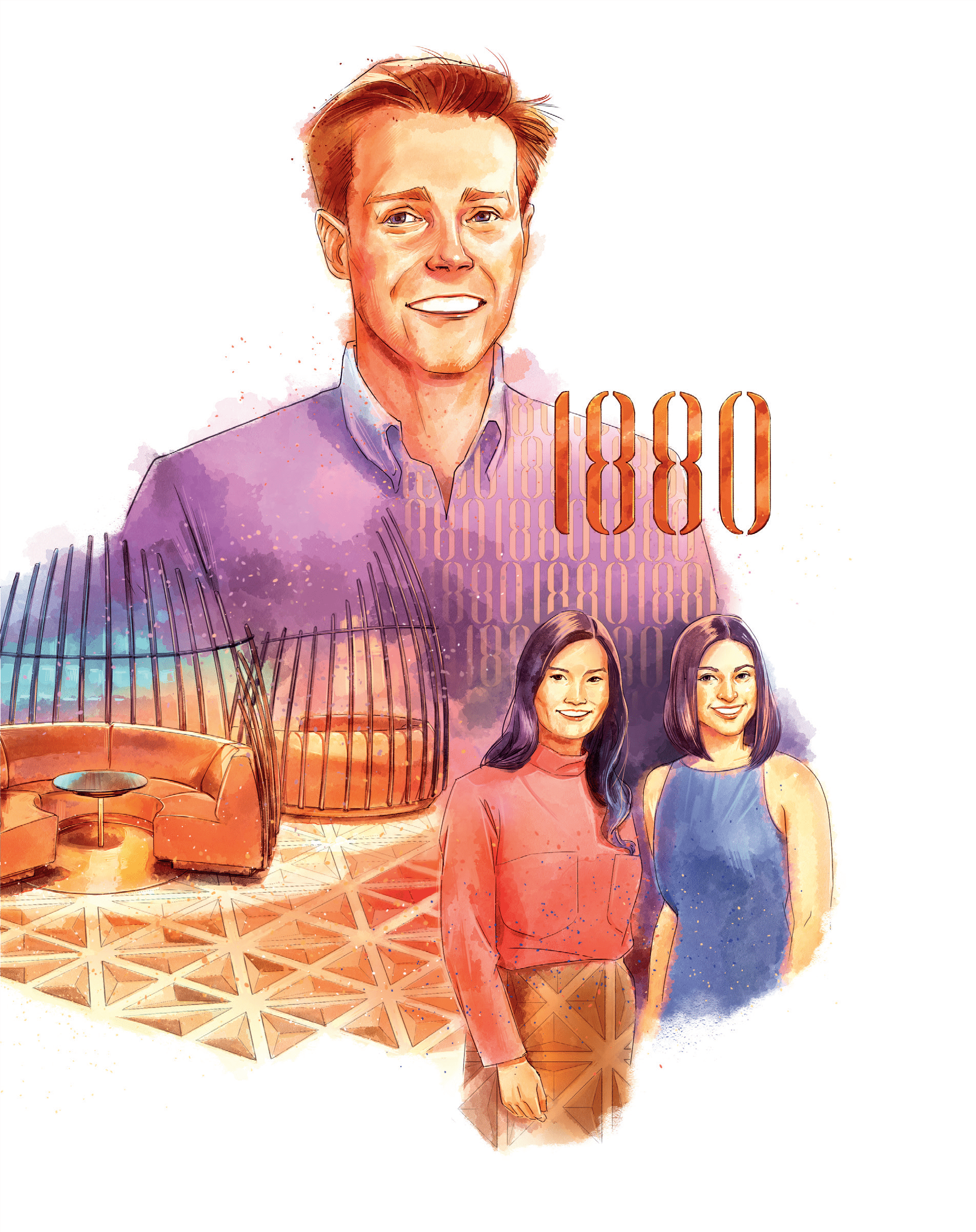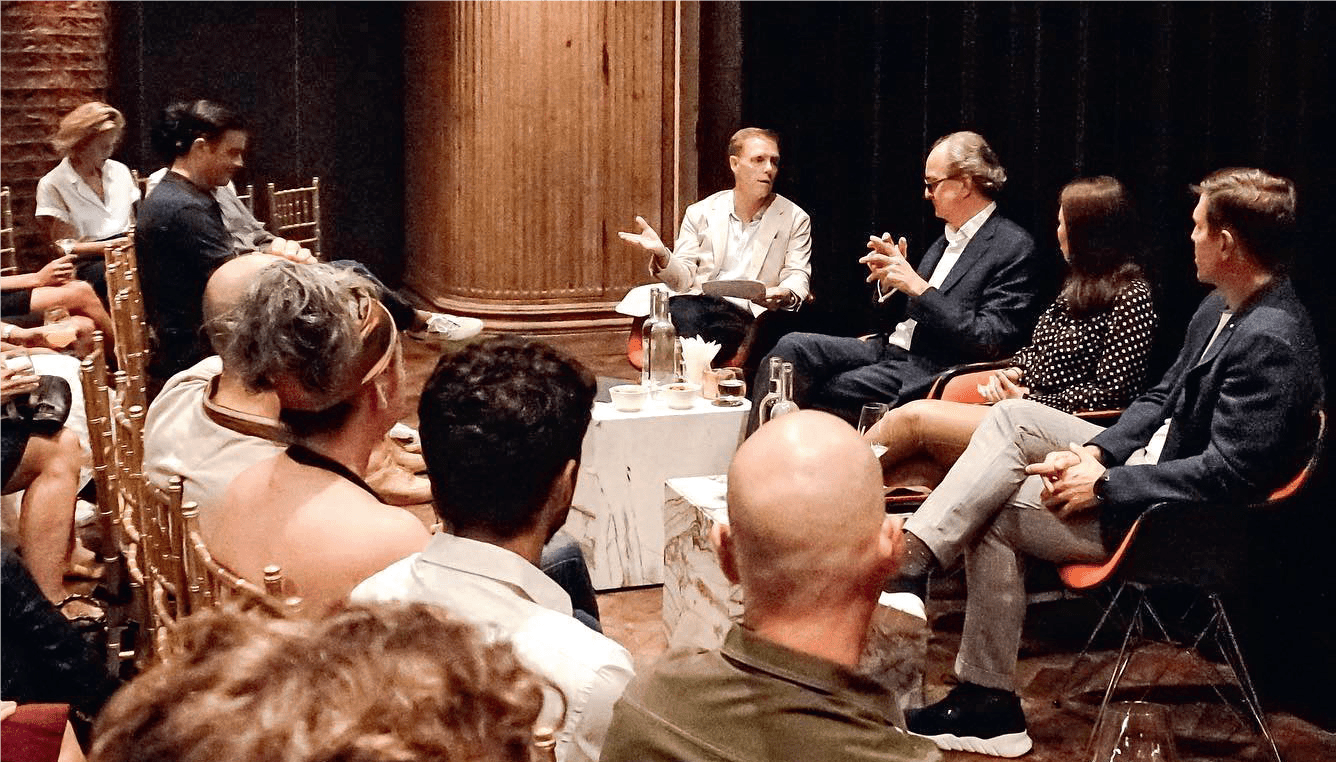Stories > A Changemakers’ Club
A Changemakers’ Club
Peeling back the layers of Singapore society, Marc Nicholson shares that balancing privilege with responsibility is the most valuable lesson he has learnt here.
BY SHWETA PARIDA
ILLUSTRATION KEN LEE
or the past 40 years, Canadian native Marc Nicholson has witnessed his parents organise weekly salon-style talks at their Montreal home during the summer months. An eclectic mix of people, such as academics, diplomats, literary critics, business leaders and founders of non-profit organisations would get together to discuss varied topics ranging from geopolitical issues to space exploration and human rights. “There was no particular reason behind these talks, other than the fact that my parents are passionate about creating meaningful dialogues in society.
“At each of these events, there would be up to 70 people at our house, discussing a myriad of thought-provoking issues,” recalls Nicholson, who would sit through the talks as a fascinated 12-year-old. “This tradition has continued uninterrupted over the years – except during Covid-19 lockdowns – and my parents have held over 2,100 salons since.”
The idea of bringing diverse communities together and sparking meaningful conversations stayed with Nicholson long after he left home to pursue volunteering opportunities in Indonesia, followed by higher education in the Netherlands and the UK. Those idealistic cerebral sessions became the genesis of his current venture: 1880 – a members-only social club for networking and collaborating purposes that attracts a diverse mix of professionals in Singapore. In addition to its hospitality component, the club, located in the Mohammad Sultan Road precinct, features a co-working space, meeting rooms and spa. With a cap on the number of memberships, new members are only welcomed on the recommendation of existing ones.
Nicholson emphasises that the bedrock of the club has always been to bring brilliant minds under one roof and spark meaningful conversations to find solutions to the problems in our world. “Singapore is home to some of the world’s most enlightened and forward-thinking people – both locals and members of the international community,” he says, “and there could not have been a better place to let this idea take shape.”

Canadian entrepreneur and human rights activist Marc Nicholson started his membersonly club 1880 to celebrate the diversity in Singapore through brillliant Singaporeans as well as foreigners who reside here.
AN EVOLVING POINT OF VIEW
The 52-year-old entrepreneur, who is married to Singaporean finance professional Jean Low – they met in the ‘90s while studying at the London Business School – candidly shares how his views towards the city-state have changed over the years.
“I would say that since I first travelled here in 1997 to meet Jean during our courtship days, the transformation has been incredible – not just physically but in many other aspects, such as the socio-cultural dynamics,” says Nicholson. “Being a liberal, free-minded individual, I was apprehensive about my ability to live in Singapore. I thought of it as a highly regulated place where even chewing gum is banned and there are tough punishments for what would be perceived as minor offences in the West.”
Since moving to Singapore 20 years ago, Nicholson’s views have changed in tandem with the city-state’s evolution. He now finds himself rebutting extraneous arguments against Singapore’s social mores. “I tell my friends that in Singapore, as long as you are mindful of your conduct and do not harm anyone or break the laws, you are absolutely fine,” he says. “Growing up in Canada and studying international relations, a more individualistic outlook and the ideals of Western democracy shaped my views.”
However, having spent time volunteering in Indonesia, followed by a stint working with a human rights organisation in Cyprus and his experience in Singapore have played a decisive role in his views towards self and society. “Now, I look at the world in a slightly different way and I appreciate the balance of rights that you are given and the responsibilities that you have as a member of a family, community and country,” says Nicholson. “The collective is a greater thing to emphasise over individual rights.”
To illustrate how the greater good often outweighs differences in opinion among communities, he cites an example from his volunteering days in Indonesia: “After my one-year-long stay in a remote West Java village, I wrote a long essay about how water is distributed across the paddy fields using a centuries-old system. The rival communities there don’t get along with each other, but the water has to trickle down and go from one community’s fields to another – for the benefit of the collective.”
“IN SINGAPORE, THE CORE PHILOSOPHY OF THE ‘GREATER GOOD’ EXTENDS TO ALL ASPECTS OF LIVING. FOR INSTANCE, THROUGHOUT THE PANDEMIC, THE MAJORITY OF SINGAPOREANS HAVE FOLLOWED THE MASK MANDATE AND SOCIAL DISTANCING RULES WITHOUT HAVING TO BE REMINDED ALL THE TIME.”
He correlates this observation to the idea that humans achieve more progress when they work together towards a common goal. “In Singapore, the core philosophy of the ‘greater good’ extends to all aspects of living,” he says. “For instance, throughout the pandemic, the majority of Singaporeans have followed the mask mandate and social distancing rules without having to be reminded all the time. This reflects their collective responsibility mindset.”
A GENERATIONAL TRANSFORMATION
Nicholson is, however, quick to point out that following rules and social constructs does not mean that Singaporeans are not capable of questioning conventional wisdom or creating new avenues of thinking. He opines that while the older generations of Singaporeans may have had to deal with more existential challenges more than 50 years ago, the current generation is anything but risk-averse. “I have often heard that Singapore’s high-pressure education system does not lend itself to creativity, but having witnessed it up close, I can confidently say that such assumptions are baseless,” he stresses.

The social club 1880 and its philanthropic arm, 1881, organise fundraising activities for good causes and salon-style talks to spark meaningful conversations on social topics that impact communities at large.
“SINGAPORE HAS GROWN FROM AN AWKWARD TEENAGER INTO AN ADULT WITH AN INTERNATIONAL MINDSET WHILE TAKING ON GREATER RESPONSIBILITY TOWARDS THE REGION AND THE REST OF THE WORLD, AS WELL AS THE PLANET.”
Elaborating his point further, he shares that during a volunteer class that he taught at the Singapore Chinese Girls’ School, he marvelled at the students’ creativity when they were asked to come up with a bold business idea. “I told them that it can be as audacious as building a resort on the moon – it is not about how to bring your idea to life or whether it is even possible,” he says. “Even though the local education system is demanding, it in fact encourages students to think of different solutions. If that is not creativity, I don’t know what is.”
Apropos his views on Singaporeans’ creative streak, Nicholson says that an entrepreneurial culture now permeates the larger consciousness of the country’s youths. “Today, Singaporeans are choosing new career paths as changemakers in areas of food-tech, artificial intelligence and sustainability,” he observes.
A MEETING OF BRILLIANT MINDS
Combining his interests in community-driven work and business acumen, Nicholson says that 1880 is a platform for some of Singapore’s most talented people whom he has been meeting since his early days as a consultant working with the Singapore Tourism Board. “Throughout my time here, I have met wonderful, high-calibre people – from C-suite executives to documentary filmmakers,” he says. “I wanted a space that would bring all these people together for the exchange of ideas and knowledge and celebrate the diversity.” While the club itself is not a non-profit entity, it organises events and fundraising activities through its philanthropic arm, 1881, and provides an opportunity for its members to contribute financially, or through skills and time.
A recent report, Nicholson shares, ranks Singapore high in volunteerism. “I was impressed to see that the report measured volunteerism not just on the basis of financial contribution but the time committed towards humanitarian initiatives.”
Partnering with public-spirited individuals from around the world is at the core of 1880. “For example, entrepreneur and philanthropist Matthew Spacie’s Magic Bus in India provides schooling and vocational courses to underprivileged youths that help them earn a living,” he says. “Yet another personality that we work with is John Wood, founder of Room to Read, which provides literacy for 26 million children in developing countries such as Afghanistan and Nepal.”
Last year, following the US withdrawal from Afghanistan, the club’s philanthropic foundation invited the head of a telecom firm to work on a joint initiative that provided data cards to girls in the war-torn country. This enables the girls, who are unable to attend physical classes, to access online classes and continue their education. Other projects supported by the club’s foundation include Nepal-based Butterfly Home that houses children of incarcerated mothers who have no family to care for their children.
Nicholson views the change in his outlook through the lens of Singapore’s progress on the world stage. “When you come here with the mindset to contribute and engage, you will see how easy it is to make friends with Singaporeans,” he says. “The analogy I can think of is that Singapore has grown from an awkward teenager into an adult with an international mindset while taking on greater responsibility towards the region and the rest of the world, as well as the planet.”
